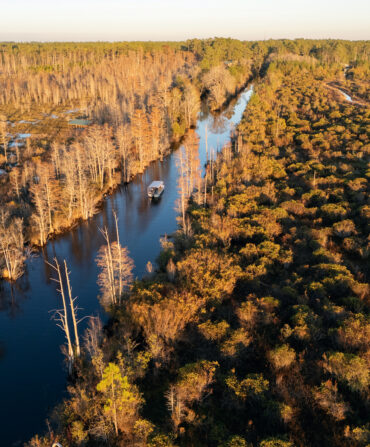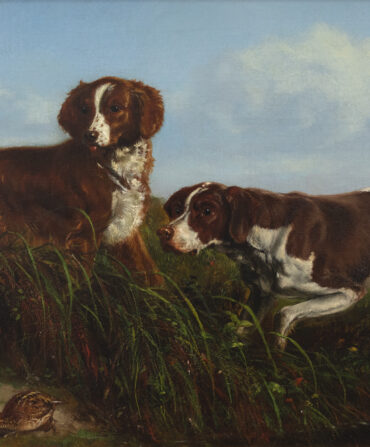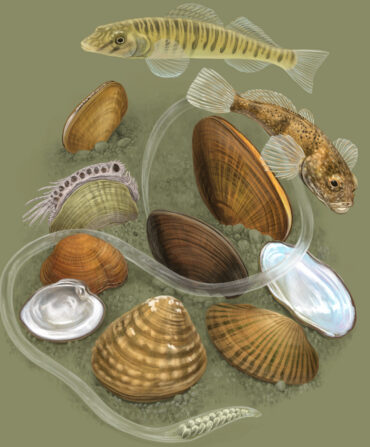Sporting
The Hen That Rules the Woods
On a dream trip to chase Osceolas in Florida, a seasoned mountain hunter finds the mother of all turkeys
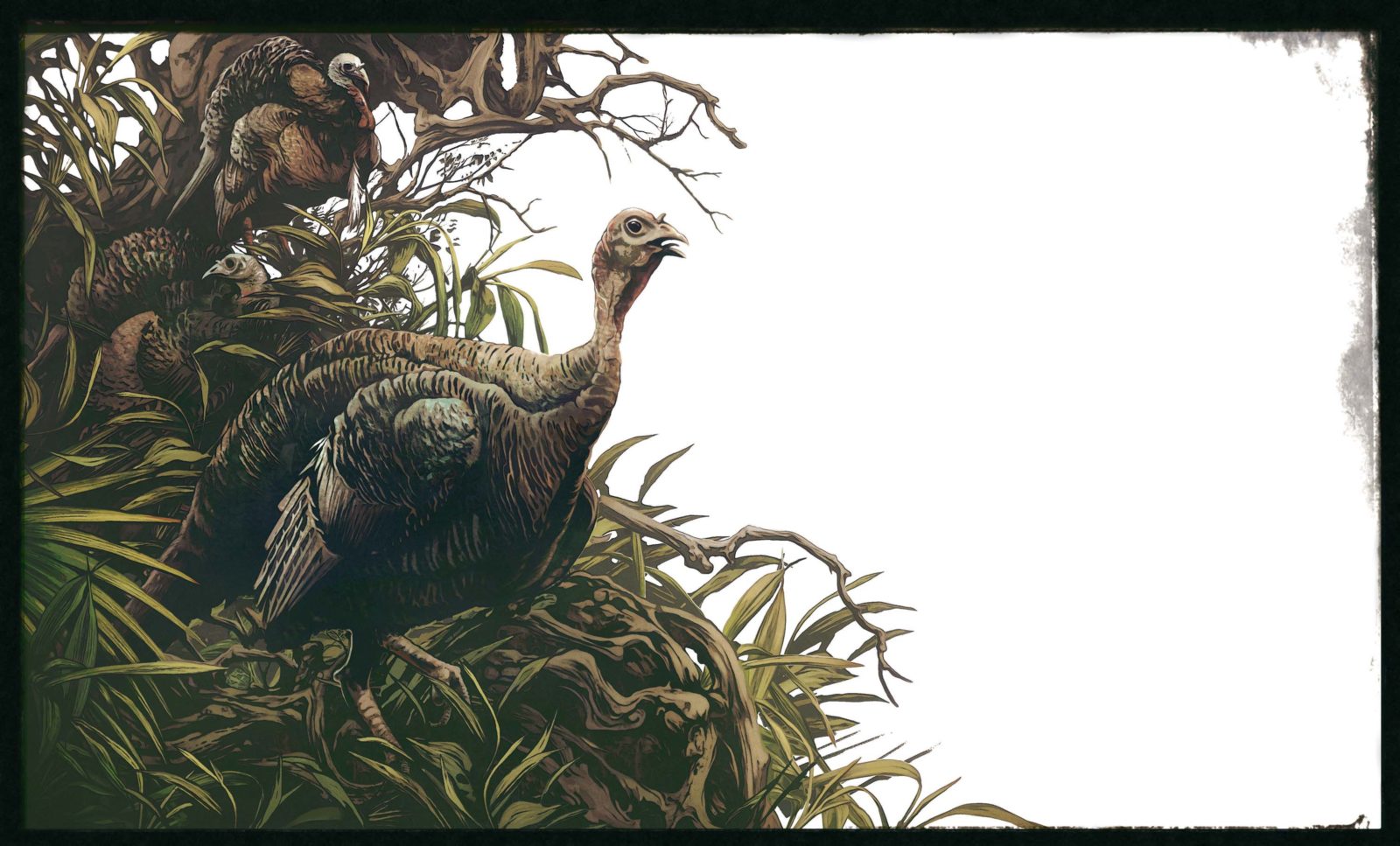
Illustration: AJ Frena
The gobbler gobbles, and his hens come to him. That’s the rule of thumb. He who gobbles loudest, puffs up the biggest, rakes his wings most aggressively against the ground, and hammers his spurs into the most heads gets the girls. At least that’s how it appears at first glance.
But picture this: It is the hen who strings the boys along those first few weeks after the winter breakup, the hen who pecks around the woods uninterested in struts and gobbles until she is ready, the hen who makes herself a place and lies down to signal she is receptive to breeding, and the hen who then wanders off to make her nest and raise her clutch alone. She is a bullheaded single mother who needs the old boy for one thing, and she doesn’t need him long. She’ll put up with the ego till the deed is done, then vanish without so much as goodbye. In a few short days, the king of spring goes from Macho Man Randy Savage to a sack full of lonely, nothing but hollow gobbles and an empty stomach. Make no mistake—the hen sets the terms.
It was the last few hours of opening day for Florida’s Osceola turkey season south of State Road 70 when I met the hen that ruled the world. My buddy Raymond and I had driven seven hundred miles from our homes in the North Carolina mountains to a place called Sidell in Southwest Florida, on the outskirts of Myakka Head. Neither of us had ever hunted Osceolas, one of four subspecies of wild turkey in the United States. My turkey hunting had always been limited to the Easterns in North and South Carolina, while Raymond had taken Eastern turkeys across the South and a Rio Grande from Kansas. We’d both heard tell of Osceolas being the hardest of the four to kill, and perhaps they are, but truthfully we just wanted the chance to get in the woods ahead of schedule. Back home, the season didn’t open for another month, and so we traded poplar woods and laurel hells for live oaks and cabbage palms, fern gullies and green briar for Spanish moss and cocklebur. When we left the mountains, there was wood in the stove and the threat of snow. But after a truck stop and Cracker Barrel march down I-75, we arrived in Florida to bluebird skies and ninety degrees.
The ranch comprised 2,300 acres of cattle pasture and oak hammocks encircling a citrus grove, and there were Osceolas all over the place. Out in the fields sandhill cranes stretched their long legs beside Charolais cattle. Owned by a friend of a friend, the J Bar C is not a pay-to-play operation with seasoned guides, but instead an invite-only piece of property that turkey nuts like me would give our left leg to access. I’d blown a shot early morning at a two-year-old gobbler that came out of nowhere, and we’d spent the rest of the day slipping along, trying to familiarize ourselves with the ground so as not to be blindsided again. By late afternoon we’d come up empty and split up in the hopes of roosting birds for the following morning.
I was leaned against the trunk of a live oak where I could watch a small tractor path between fields and listen for turkeys in the distance. Off to my right, a fence line marked the edge of the property, and on the other side, a narrow swamp emptied to duckweed and muck. A drift of wild hogs had been sloshing their way through the swamp for the last forty-five minutes, their footsteps sucking at the mud. Three yearling does were nosing through the greenery among them when the hen came into earshot.
She fired up over a few cuts and yelps I’d sent across the field with a Cane Creek mouth call. At first I thought it was Raymond answering me, because that’s the thing about turkeys when they really get to making noise—it doesn’t seem natural. You tell yourself that it has to be another hunter because there’s not a bird in the woods that would make that much racket, but they do. Especially the ones running the show, and she was the belle of the ball.
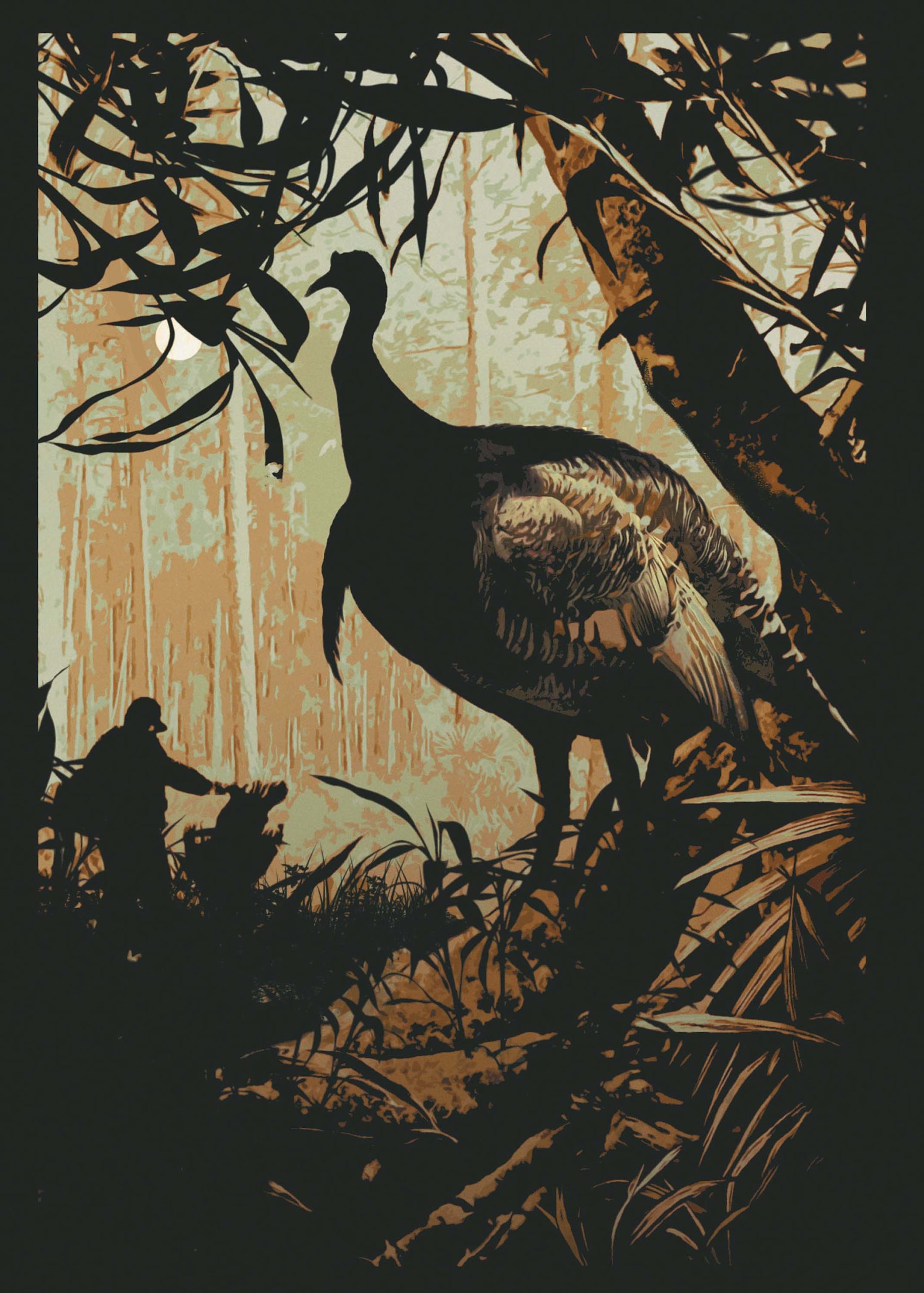
AJ Frena
I realized quickly that squawking on a mouth call wasn’t going to faze her, and so I pulled a Garrett Fowler pot call out of my vest—aluminum over slate, turned from an oak burl I salvaged out of a cord of firewood—thinking the rasp might match her tone. She yelped and I cut her off. She cut louder and I dug the striker into the calling surface to try to top her volume. Over the next few minutes, we acted out an episode of Jerry Springer screaming back and forth across that field, and eventually I watched as she led a pair of toms and a small harem of jenny hens under the barbed wire and into the swamp.
The old girl had a voice like she’d spent a lifetime chain-smoking Winston 100’s in a pool hall. If turkeys coughed, she’d have hacked and gagged and spit something into a Kleenex, then slipped the tissue back into her purse without missing a note. She was the kind of hen that would’ve pulled a jackknife on some gal in a Waffle House parking lot over a man she could take or leave depending on the night. That’s the kind of hen every gobbler’s really after. The old hen. The boss hen. The hen that’ll cut every other girl off midsentence and finish what she was saying.
That evening I was nothing more than some homely bird singing the Judds’ “Why Not Me” as I yelped off-key on that mouth call. The gobblers didn’t so much as glance in my direction, and looking back, who could blame them?
With birds roosted, Raymond and I set up a blind by moonlight the next morning. Not long after daybreak, the first few gobbles volleyed from the far side of the swamp, and in their echo we heard her cackling and cutting like she’d been up all night just waiting to give them hell.
We had the blind tucked into a windrow between fields with a decoy setup off to our left—a pair of hens and a quarter-strut jake—on a tractor path we thought the birds would use to swap pastures. Soon enough, there they were, at first nothing more than heads peeping over the horizon, then dark silhouettes sifting through oat grass as they slunk into view before us.
At the first strike of the call, one of the gobblers swelled into strut and the other stretched his neck to thunder across the field, but what those longbeards perceived as harmless flirting didn’t sit right with the woman in charge. She clucked and cut and yelped and cussed and I could hear it in her voice as she squalled, “Get in the house, Clydeth! Get in the house or I swear on my mama’s grave I’ll come upside your head with a frying pan!” She cracked the whip and the boys fell in line. Raymond and I watched as she pulled them on a leash toward the woods, making it clear there would be no coming across.
Knowing we were losing them, Raymond interrupted her with a mouth call. Maybe it was the rasp, the volume, or the tone, or maybe it was those gobblers thinking they were finally hearing a hen that wasn’t about to take any lip, but those two toms stopped dead in their tracks as Raymond wailed away. Suddenly one of them turned, and as soon as that happened, the other tom broke stride. They were dumb with love and lust, and for a moment, for one split second, I honestly believed the tide had changed.
But that old hen, seeming to realize that one way or another the boys were going to the bar, slid in between to ruin any chance for a good time. She bumped against them and severed their paths, blocking them from strutting straight in to the setup. After that, she took the lead and dragged them on a wide arc around us. In the end, they came across the field, but they did so on her terms and well out of gun range.
What I know now is that longbeards love bowling-league hens named Tammy. A tom wants a woman who shotguns tallboys of Busch Ice in the Dollar General parking lot, a gal who keeps a few Tijuana Mama pickled sausages in her purse just in case her sugar gets low. He wants a woman whose prized possession is a teacup-sized hunk of fender off Bill Elliott’s race car, a woman that’ll slide into the Howard Johnson’s hot tub in a Reba McEntire T-shirt. A tom finds him a hen like that and he’ll never break strut. That was the hen we were up against, and trust me when I say that we never stood a chance.
She pecked around the field behind us for an hour while we watched through the back of the blind, the toms holding tight to her heels. Eventually she showed the boys into the timber, and we slipped out to give chase. We paralleled them for a while through oak groves and thicket, but by the time we reached the last field, I knew the birds were spooked. The ground was littered with shed palm fronds and bootjacks so that footsteps snapped like firecrackers. Raymond took a step, and I heard that hen make the worst sound in turkey hunting—a single alarm putt—and off they went. I saw her zigzag through the oaks, her two boyfriends weaving past palms behind her, as she sprinted for the citrus grove. That fast and it was over. Whether they knew it or not, that woman had saved their lives.
That afternoon Raymond and I split up again, and as a tangerine sun started to sink behind the live oaks, I heard a single shot echo from a quarter mile and knew Raymond had found his bird. With little time remaining and no turkeys in sight, I stood up from my hide and took off, hoping to reach him before the last of the light was gone. I met him coming through a field along the edge of a dry ditch with a purple dappled sky stretching forever behind him. The longbeard he carried had limb-hanger spurs, and jet-black wings unlike any of the Easterns back home.
“That’s a damn fine turkey,” I sputtered, huffing and out of breath from running.
A slight smile lifted his cheeks. “One of them Osceolee-Os,” he said.
Back at the lodge, we poured our drinks a little taller than the evening before. We swapped stories and joked around the supper table with the others in the house, then made a last-ditch plan for our final hunt before heading off to bed. We’d hear that boss hen once more the next morning not long after first light. The gobblers hammered from the roost, but as soon as they hit the ground, she came in cussing like always, and in a matter of seconds she drew them onto a neighboring property and out of our lives for good.
We stayed in the woods till midmorning but never heard or saw another bird. I finally called it quits beneath a wild orange tree with half-eaten fruit and dried peels littering the sandy ground around me. Raymond said we could try moving, but I knew we needed to hit the road, and where we stood seemed a fine place to end it. We took turns swinging sticks at the lowest-hanging Hamlins, and I finished my Florida hunt with citrus juice running through my beard, beaten but smiling.
A few miles into Georgia, Raymond and I stopped and got a hotel room. We bellied up to the bar at a nearby Texas Roadhouse with twenty-four-ounce Bud Lights in frosted glasses—him celebrating his latest gobbler, me drowning my sorrows on my one blown shot. When we got back to the room, I called my girlfriend, Ashley, and told her about that hen and how I hoped an alligator’d swallow her whole.
“I like her,” Ashley said, because the most desirable hens always stick together.
As for me, I did what any half-witted gobbler would’ve done this late in the season. I kept my mouth shut and toed the line, having learned long ago not to argue.
David Joy, a twelfth generation North Carolinian, is the author of five novels, most recently Those We Thought We Knew (winner of the 2023 Willie Morris Award and the 2023 Thomas Wolfe Prize). Others are When These Mountains Burn, The Line That Held Us, The Weight of This World, and Where All Light Tends to Go. He is also the author of the memoir Growing Gills: A Fly Fisherman’s Journey and a coeditor of Gather at the River: Twenty-Five Authors on Fishing, a book that raises money for the CAST For Kids Foundation. Joy lives in Tuckasegee, North Carolina, with his dog, Edie Munster. Read more at his website.


